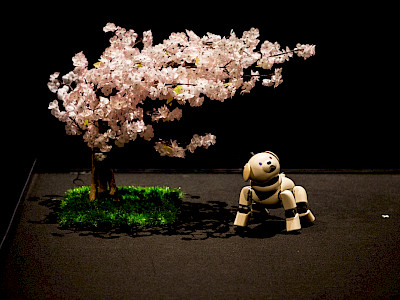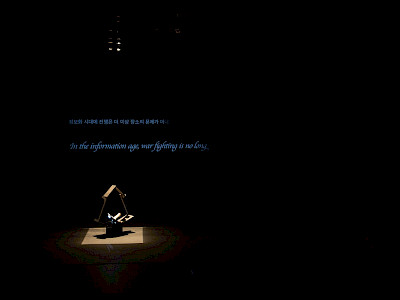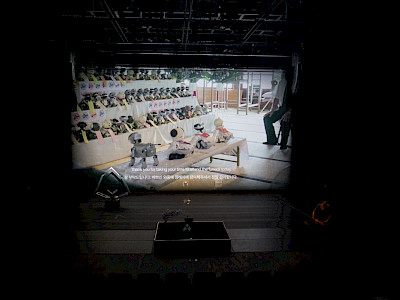17 — 19.05.2018
Jisun Kim Seoul
Deep Present
performance — premiere
English → NL, FR | ⧖ 1h | € 16 / € 13 (-25/65+) | Meet the artist after the performance on 18/05
Outsourcing – in reference to the outsourcing of tasks and functions to machines, robots, or algorithms – is an original industrial strategy with a view to lowering costs and creating greater efficiency. But today, it infiltrates into many systems and domains. South Korean artist Jisun Kim sees outsourcing as an operating mechanism of the modern society. Thanks to artificial intelligence (AI), people are about to outsource even their thinking-power to algorithms. It’s happening in theatre, as well. In Deep Present you get to know HAL, AIBO, Libidoll, and Tathata, four unusual performers. These are not people but replicas of human intelligence, each with its own unique voice, and they engage in dialogue with each other. Raised on stage are reflections and questions on how our thoughts and the social system is constructed through outsourcing. Who are we? Where do we come from? Where are we going?
Conversation with Jisun Kim about Deep Present
The keyword of this work is ‘outsourcing.’ What drew you to this subject?
In 2015, I created a work called Climax of the Next Scene. In this work, I met all kinds of rule breakers in the online game world with the aim of questioning the system we live in and searching for an exit from it. During this process, I came to ponder over today’s ‘sense of reality.’ In other words, how do we perceive and sense this world we live in? I feel that the way we experience the reality nowadays is as artificially refined as the experiences of the online world. Senses of danger, risk, pain, violence, and death are considered to be negative, elements that need to be eliminated from life. We leave just a tint of them with us after refining them into easily digestible sugar cubes; the rest of such uncomfortable experience is detached from life and chucked to somewhere far beyond. Even the most primal experiences of a human being, such as sex, pregnancy, and childbirth are outsourced in the form of virtual sex or surrogate mothers to minimize the risk and pain. A war in today’s world is one of the most obvious cases of outsourcing, in which legitimate corporations take over not only the risk but even death. Outsourcing is a combined product of the innate human desire to escape from uncomfortable senses and the capitalistic mechanism that helps this process of subrogation become more efficient and economical. In this sense, I believe that outsourcing is the most fundamental operating system of today’s society.
Yet, in a capitalistic society, outsourcing ultimately becomes the constant process of shoving garbage further away to the other. It is a competition of who sends the by-products of a capitalistic life – pollution, poverty, war, refugees, etc. – further from where they stand. In the given power structure of the world order, most of these by-products flow from the powerful to the weak. And most of this process entails violence in one form or another. But the clear fact is that both the garbage and the human race cannot escape planet earth.
How did Artificial Intelligence come into this discussion?
For me, at the pinnacle of outsourcing, or at the final stage of outsourcing is the outsourcing of human intelligence: Artificial Intelligence. I think we are trying to outsource our ability to reason because of our desire to minimize the uncertainty that is ever-present in our lives. Compared to the human brain, artificial intelligence analyses a larger sum of data more accurately and more efficiently. The outsourcing of human intelligence to the AI is especially interesting for me because, with the emergence of AI, humans no longer need to raise the question of ‘why’ and ‘how.’ One cannot retrace why and how an AI calculated a certain output value because the amount of data processed surpasses human comprehension. We have to accept it as the optimum conclusion. The minds of humans, originally troubled with all kinds of moral and justificatory questions, will be radically simplified. And this might spark a fundamental change in our social structure.
With these issues in mind, I started working with actual AIs. During the process, a new question popped up. Every single AI algorithm is created in the hands of a programmer. Every single AI derives its optimum output value based on the object goal set by the programmer. For instance, we assume that the navigator in our car guides us after calculating the shortest distance or the shortest duration to the destination. However, depending on who sets which objective to the navigator, it can make the driver take a detour to ease the general traffic or lead him to take toll roads to raise more tax. Every Artificial Intelligence, in other words, outsourced human thinking, is ‘programmed’ by somebody and operates within a ‘designed’ frame (algorithm). If so, who are the programmers? Who programmes the outsourced thinking? To which direction and for which purposes? Will it be possible for us to question ‘why’ and ‘how’ an output value was derived?
How did you work with the Artificial Intelligence?
I developed a conversational AI with the Intelligence System Research Lab at Korea Aerospace University. Led by Professor Chi Sungdo, the main research field of the Lab is to develop aviation drones or selfdriving system for airplanes in collaboration with the Ministry of National Defense. However, oddly enough, Professor Chi also researches on the possibility of creating an altruistic AI. When I came across his book Artificial intelligence and Buddha, I realized that his idea of an altruistic AI resembled one of my AI characters. I contacted him and was lucky enough to be able to work together with his team. We developed a conversational AI program based on deep learning. Well known examples of such conversational AI are Siri from Apple or Alexa from Amazon. While these AIs serve a general purpose, trained with big data and therefore capable of conversing on any subjects, the AI that we developed only studies specific data and can only converse on specific subjects. I designed four characters of different personalities and entered corresponding data. Because of the differences in the data it studied, each character developed its own unique world view and responded differently to the same questions. I chatted with them regularly. The scenario of this work was written based on the dialogues and questions raised during this process.
Can you introduce us to the AI characters?
Each character developed its own personality by studying different data. HAL was inspired by the robot HAL9000 from Stanley Kubrick’s 2001: A Space Odyssey. It studied the twits of the participants of the World Economic Forum as well as data on outsourcing. Libidoll is an internet novelist. It incorporated twitter database and studied search results of certain key words on large, influential internet communities like Reddit and 4chan. AIBO is an AI pet robot created by Sony in 1999. Ever since Sony stopped manufacturing it and providing AS services, many of them started ‘dying.’ AIBO in our work carries out funerals for these dying robots. Along with the data already stored in its own memory disk, AIBO studied the interview that I had with the monk who actually holds such funerals at a temple in Chiba prefecture. Tathata studied parts of the scriptures of Zen Buddhism.
Why is the work titled as Deep Present?
The first chess-playing computer was called Deep Thought. It was named after the supernatural computer in the novel The Hitchhiker’s Guide to the Galaxy, programmed to calculate the answer to the Ultimate Question of Life, The Universe, and Everything. Ever since the appearance of Deep Thought, other chess-playing AIs were named after it as Deep Blue and Deeper Blue. The developing company of AlphaGo, now merged with Google, is also called Deep Mind. So based on this tradition(?) I also wanted to create a work on Artificial Intelligence starting with the world ‘deep.’ I decided to name it as ‘Deep Present’ because this work aims to reflect on the ‘present’ issues and at the same time, considers the emergence of the AI as a ‘present’ for humans to be able to timely raise fundamental questions on themselves and their system.
Conception & direction
Jisun Kim
Performers
HAL, AIBO, Libidoll, Tathata
Producer
Seonghee Kim
Collaborative producer
Shinu Kim
Technical director
Jimmy Kim
Conversational artificial intelligence development
Intelligent System ResearchLab, Korea Aerospace University,Sungdo Chi (supervisor), Hyungeun Kim (excecutive), Isaac Kim (excecutive)
Hardware production of Libidoll & Tathata
Donghyo Kim
AIBO costume production
Gaain Doll (Sanghee An)
Props
The Art Society
Intro video/image production
Sounion Hong
Lighting design
Takayuki Fujimoto / Kinsei R&D
Sound design
Taesoon Jang
Music
Jisun Kim
Scenario advisor
Jihye Lim
Special thanks to
Yuko Uematsu, Noriko Mitsuya, Norimatsu Nobuyuki, Ooi Fumihiko (Kofukuji 光福寺), Mobara Sangyo (茂原産業)
Presentation
Kunstenfestivaldesarts, Théâtre National Wallonie-Bruxelles
Coproduction
Kunstenfestivaldesarts, National Museum of Modern and Contemporary Art (Seoul), Wiener Festwochen, SPRING Performing Arts Festival (Utrecht)
Supported by
Korean Ministry of Culture, Sports and Tourism, Seoul Metropolitan Government, Seoul Foundation for Arts and Culture, Korea Foundation for the Advancement of Science and Creativity, Doosan Art LAB of Doosan Art Center, Center Stage Korea – Korea Arts Management Service








